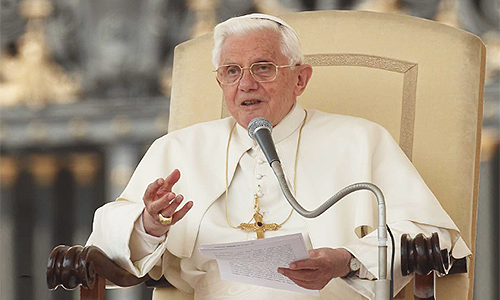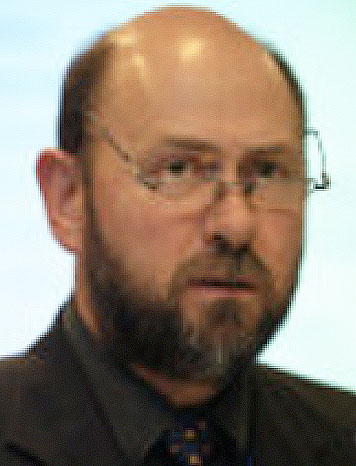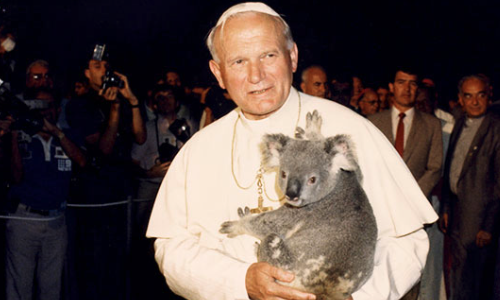
by PAUL COLLITS – THE year 2022, now mercifully passed and past, was more than anything else a year in which we lost many that could be counted as “best in breed”.
Just think of Shane Warne, Queen Elizabeth II and now, alas, Pope Benedict XVI.
- It is difficult to write about Benedict without reference to the man who unfortunately took his place.
- Benedict’s scholarly output was immense and profound, and when he wrote for the punters, immensely accessible.
- Above all, when Benedict reigned, it still made sense to regard the question – is the Pope a Catholic? – as a joke.
Paraphrasing Oscar Wilde, to lose one of true greatness might be regarded as misfortune. To lose two looks like carelessness. What about three?
All of these giants among humankind transformed their day jobs in immense ways, such was their peerless performance of their craft. We should not expect their like again. Certainly not if you look at their immediate successors.
UNFORTUNATELY
It is difficult to write about Benedict without reference to the man who unfortunately took his place, but one must try.
Comparisons can be odious. Like his predecessor, St John Paul II, Joseph Ratzinger, the German Shepherd (and not God’s Rottweiler, after all), combined saintliness with consequence, though his tenure was much shorter.
He resurrected theology as a core concern of modern Catholicism, regarded by many who should know as the best at this craft in the twentieth century. The best since Cardinal Newman, as one observer has noted.
Speaking of Benedict’s predecessor, the two of them were active collaborators and dear friends. Benedict was clearly 2-IC for twenty-seven years, a genuine Vice Pope.
What John Paul did for philosophy, Benedict did for theology. Between this holy top team, they corrected course in the Barque of Peter after some of the sillinesses of the sixties and seventies, which had included rabid experimentation with all things liturgical, radical Church feminism and liberation theology.
If the smoke of Satan entered the Church in those times, as Pope Paul the Sixth suggested, then it might be said that Popes John Paul and Benedict chased at least some of that smoke away.
Benedict gave precedence to restoring the lost beauty of the Catholic liturgy. His superb 2007 Motu Proprio, Summorum Pontificum, was a masterpiece and gave those of us who seek actual beauty in worship – believing, as we do, that God wishes us to accord worship appropriate deference – hope that all had not been lost since 1969.
Benedict’s revival of the Mass of the Ages provided a pathway to holiness and devotion for many young people, and some that are not so young. His views on the liturgy and the priority he gave it demonstrated his recognition of the closeness of the relationship between beauty and goodness and truth.
This was also reflected in his declared number one enemies of the age, secularism and “the dictatorship of relativism”.
Benedict gave tradition due recognition. Now, of course, the past is the enemy, as someone wise noted recently. And Benedict was paid due recognition by both Neocon Catholics like George Weigel and by the soldiers of tradition like Michael Matt of The Remnant magazine.
WARRING
Quite a feat, to unite these often-warring parties.
He even brought restless Anglicans on board (via the Anglican ordinariate) with Anglicanorum Coetibus, in an outstanding result for Christian unity.
Benedict also gave Islam a touch-up, in his (in)famous Regensburg lecture of 2006. Only a scholar of Benedict’s towering intellect could pull off what many regarded as a slap in the face for those who read the Koran with deference.
For a scholar, he was a man of the deepest and broadest learning, who once went toe to toe (or brain to brain) with Jurgen Habermas, a fellow German and the doyen of the Leftist Frankfurt School
They even co-authored a book following their debate.
Benedict’s scholarly output was immense and profound, and when he wrote for the punters, immensely accessible.
His disquisition on the Church Fathers is but one example among many, distilled from some of his Wednesday audiences which typically attracted pilgrims and locals in their tens of thousands.
He drew half a million to Randwick Racecourse during the final Mass at World Youth Day in 2008. As it is often said, people flocked to see John Paul. In the case of Benedict, however, they came in droves to hear him.
Contrary to those who think they know the minds of Benedict and his many followers, the German Pontiff did not disavow the work or the results of the Second Vatican Council, whatever one might think of its fruits.
He saw Vatican II not as a fissure but as an extension of the true Church. This as the so-called “hermeneutic of continuity” and not of rupture. He was, after all, one of the Council’s young architects.
Downsides?
No, Benedict didn’t fix the Vatican, if that was considered to be part of his mission. One has cause to wonder who on earth could. Our greatest religious pugilist, George Pell, tried to fix one part of it, to fulfill the pledge of Benedict’s successor, and look what the Mafia did to the Cardinal.
The result of his endeavours? 404 days in jail and being awfully close to losing his reputation and possibly his life, on trumped up charges dreamed into existence, at least at the Australian end of the operation, by an unholy cabal of fembots, Leftest politicians and questionable cops.
Indeed, it might be argued that the Vatican did Benedict in. In Pell’s view, he was not interested in governance.
It certainly messed with his head, probably causing him to resign as Pope, not something one sees every day. You have to look up Celestine the Fifth, in fact.
Benedict’s resignation was his most controversial act, and his most disappointing for his many friends. The rag-tag bunch of miscreants, communists and homosexualists that inhabit the darker corners of the little kingdom across the Tiber are still in place, alas.
In an article published the day before Benedict died, Kennedy Hall (at Crisis) suggested that “a storm is coming when Benedict dies”. We shall see.
Hall (more critical than I of the late Pope) notes, in relation to Benedict’s failure to unite the Church, which Hall describes as a “dysfunctional family”.
Yes, in the end he did, in fact, flee the wolves. The enemies within. There are no wolves, though, where Benedict undoubtedly resides now.
Hall’s fear is that the gloves will come off, absent Benedict’s fairly benign presence in the background in Rome.
Some might reasonably argue, though, that so much damage has already been done to the Church since Benedict’s untimely resignation, that a little more rampant modernism won’t make much difference.
Not when there are now Prayers of the Faithful at Mass (in Wyoming Parish, NSW, on January 1 2023, to be exact) praying for the adoption of the Aboriginal Voice to Parliament. Prayers about action on so-called climate change are routine.
Were there other downsides during Benedict’s pontificate?
PERFECTION
Alas, we are all far too human to achieve perfection. Christ, after all, could hardly be said to have chosen the crème de la crème as His apostles.
The usual suspects critical of Pope Ratzinger point to sex abuse among priests. (Those that don’t emphasise his membership of the Hitler Youth, compulsory, of course, for all the German children of his time).
Despite the best efforts of some, Benedict had a clean bill of health on the moral panic of the age. He described abusing priests, just prior to his election in 2005, as “filth” in the Church in a homily that some at the time regarded as his plea to the College of cardinals not to make him Pope.
For it was a job that he never wanted, I am guessing. The professor, the gentlest of men (a “Christian gentleman of the old school”, as George Pell has described him in his own obituary of Benedict), just wished to be a contemplative scholar.
The sort of thing he eventually did in his highly productive retirement. (Of course, the Conclave of 2005 didn’t grant him his wish, despite the best efforts of the nefarious St Gallen mafia, as the progressive liberal Cardinals are known).
Above all, when Benedict reigned, it still made sense to regard the question – is the Pope a Catholic? – as a joke.
Now, not so much. Crisis magazine simply called Benedict “a man sent from God”. Of his successor, people of faith are largely reduced to sighing and, perhaps, concluding that “God’s ways are not our ways”.
What of Benedict’s legacy? In the words of The Remnant:
- An entire generation of young Catholics were reconnected to the Mass of our fathers, thanks to Benedict.
- As Joseph Cardinal Ratzinger, he was instrumental in the founding of the Fraternity of Saint Peter.
- He made it clear that the Latin Mass was never abrogated, and never could be.
- He lifted the excommunications of the bishops of the Society of Saint Pius X.
- But in the end he left the Church in the hands of one of the worst popes in history.
All but the last are incontestable statements. The last point is, at the very least, a plausible hypothesis.
A good Pope but not a great one, was Pell’s considered verdict upon Benedict’s death. Leaving a “mixed legacy”.
Nonetheless, the world’s deep loss is Heaven’s massive gain, one feels.
We shall not see his like again. A little like Shane and Elizabeth, perhaps.
We know, of course, that Benedict and Elizabeth struck up quite a rapport during his historic visit to Britain. I am not aware of what he thought of Shane Warne.PC












